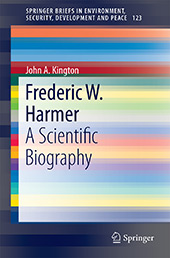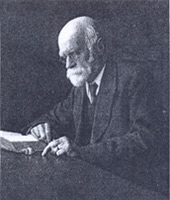|
|
| |
|
| |


SpringerBriefs in
Environment, Security, Development and Peace (ESDP)
A Peer Reviewed Book Series
Edited by
Hans Günter Brauch
Free University of Berlin and AFES-PRESS
 |
John A. Kington: Frederic W. Harmer: A Scientific Biography. SpringerBriefs in Environment, Security, Development and Peace, Vol. 19 (Cham – Heidelberg – New York – Dordrecht – London: Springer-Verlag, 2014).w
ISBN (Print): 978-3-319-07703-1
ISBN (Online/eBook): 978-3-319-07704-8
DOI: 10.1007/978-3-319-07704-8
Order Form
Order this book on the Springer Website
Order electronic version and individual chapters |
| |
|
- Harmer's historic geological photographic collection (40 black and white images)
- Harmer's pioneer studies of East Anglia’s Pliocene and Pleistocene deposits
- Harmer's pioneer reconstruction of Ice Age atmospheric circulation patterns
|

|
Comprising the first definitive account of the geological and palaeometeorological studies made by Frederic W. Harmer (1835-1924), this book contributes a previously missing chapter to the history of science. The main objective of the author is to ensure that the scientific work of Harmer, which unfortunately has been widely neglected or forgotten, becomes more generally known and acknowledged. The balance of this deficiency will be redressed by bringing to light in this volume his contributions to the history of science to an audience of academic and lay readers of the current literature.
Harmer was one of the pioneers in the field of East Anglian geology as well as one of the last members of a distinguished group of amateur geologists who had been responsible for making major advances in the science during the Victorian era and early years of the 20th century. In particular, he played a key role in elucidating the Pliocene and Pleistocene stratigraphy in the east of England by developing the use of mollusca for biostratigraphic correlation within the Crags of East Anglia.
He was certainly a well-respected scientist in his day, being awarded Hon. M.A. Cantab., elected F.G.S. and F.R.Met.S., and a Membre Hon. de la Société Belge de Géologie et de Paléontologie. From an early age he had been an active member of the Geological Society of Norwich. In 1902 he was awarded the Murchison Medal for that year in recognition of his work on the Pliocene and Pleistocene deposits of East Anglia. A leading exponent of 19th-century geological literature, Horace B. Woodward, F.R.S., F.G.S., included Harmer in a group of geologists who ‘have added greatly to our knowledge of the structure of the [East Anglian Crag] deposits’. |
| |
|
Content Level » Research
Keywords » East Anglian Crags - Glacial Landforms - Palaeometeorology - Pleistocene Epoch - Pliocene Epoch
Related subjects » Geology - History of Science
Table of contents
Introduction.- Family background and public life.- Geology.- Palaeometeorology.- Final years.- References.- Bibliography of the Writings of Frederic W. Harmer.- Glossary Index.- On the Author.- On this Book. |
| |
|
On the Author |
 |
Born in London, 1930, John A. Kington joined the U.K. Meteorological Office in 1947 gaining experience in synoptic meteorology as a weather observer and forecaster both at home and abroad. In 1958, he obtained his first degree, B.Sc. in Geography, at the University of London, studying under Professor Gordon Manley and in 1959 passed the Advanced Forecasting Course of the Meteorological Office. After gaining his M.Sc. in Meteorology in 1969 he began his academic career with the study of Climatic Change and Historical Climatology, first at the University College of Swansea and, since 1971, with Professor Hubert Lamb at the Climatic Research Unit, School of Environmental Sciences, University of East Anglia in Norwich, where he is Visiting Fellow. In 1999, he was awarded the Jehuda Neumann Memorial Prize of the Royal Meteorological Society. Among his major research interests are: Historical Climatology: The Weather of the 1780s over Europe, Cambridge University Press, 1988 (digitally printed version, 2009); The Weather Journals of a Rutland Squire: Thomas Barker of Lyndon Hall, Rutland Record Society, 1988; Climate and Weather, Collins New Naturalist Library, HarperCollins, London, 2010; History of Meteorology and Climatology: The Weather Book, Michael Joseph, 1982; Climates of the British Isles: Present, Past and Future, Routledge, 1997; and Synoptic Meteorology: Even The Birds Were Walking: The Story of Wartime Meteorological Reconnaissance, Tempus, Stroud, UK and Charleston, USA, 2000; WEKUSTA: Luftwaffe Meteorological Reconnaissance Units & Operations 1938-1945, Flight Recorder Publications, 2007.
Related Research Projects: Atlantis der Nordsee [Atlantis of the North Sea], A film by Gabriele Wengler, ECO Media TV-Produktion GmbH, Hamburg, 2010; An Oral history of British Science: John Kington: Meteorologist-Climatologist (interview by Paul Merchant), National Life Stories, British Library Sound Archive, London, October 2010-February 2011. A list of his over fifty articles published in various scientific journals can be found in the website of this book. |
|
|
|
|